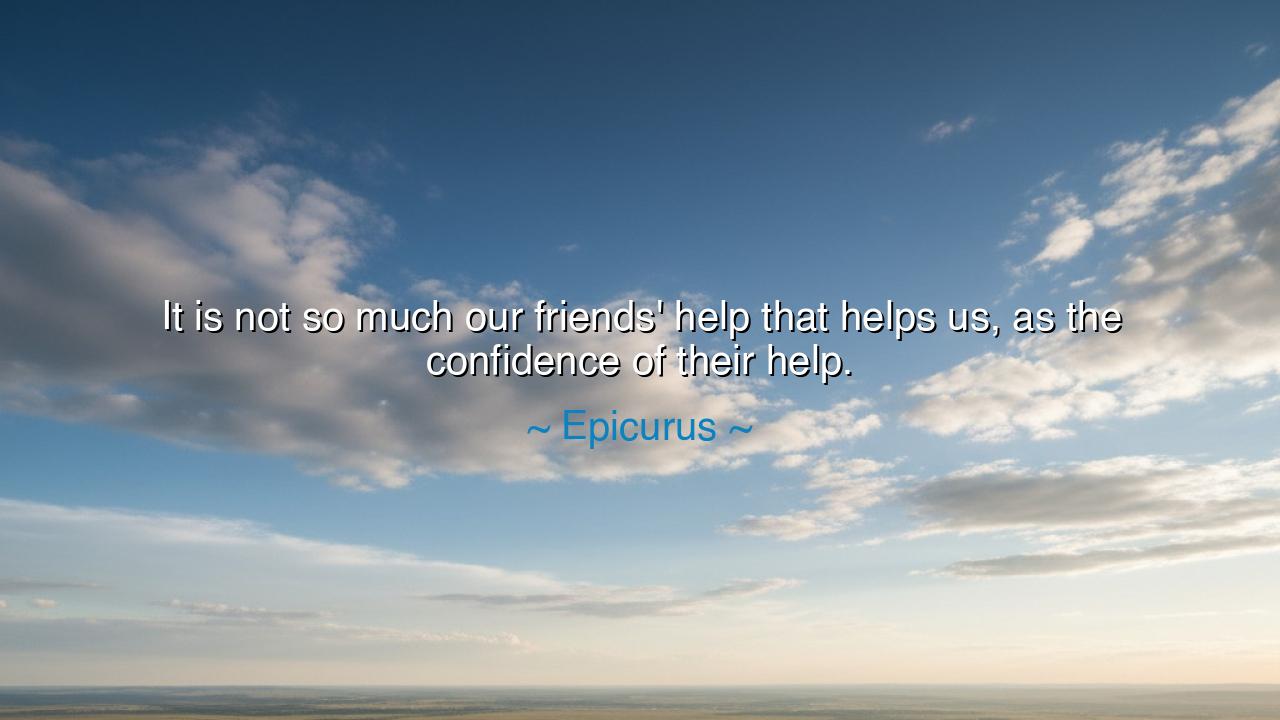
It is not so much our friends' help that helps us, as the






Epicurus, the philosopher of peace and quiet joy, once wrote: “It is not so much our friends’ help that helps us, as the confidence of their help.” In this subtle and luminous saying, he reveals the deeper nature of friendship — that its greatest gift is not the aid it gives, but the assurance it offers. For when we know in our hearts that someone stands with us, even if far away, our burdens grow lighter and our courage stronger. The mere knowledge that we are not alone transforms fear into endurance, and despair into calm. Such is the invisible power of trust, which nourishes the soul more than any material act of kindness ever could.
The origin of this wisdom lies in the heart of Epicurus’s philosophy — a philosophy not of indulgence, as some wrongly believe, but of tranquility and simplicity. He taught that the highest form of happiness is not found in wealth or power, but in friendship and inner peace. For Epicurus, friends were not just companions of pleasure but guardians of the spirit. To have a friend, he said, is to possess another self — someone whose presence, whether near or far, gives us confidence in the face of life’s storms. It is this confidence, not merely their actions, that sustains us; for even when no help is given, the heart that knows it could be given rests in peace.
Indeed, it is often the faith in friendship, rather than the act itself, that carries us through hardship. To live with such trust is to live with strength. Consider a traveler crossing a wild and dangerous land. If he knows that a friend waits for him at the journey’s end — that someone will come if he falls, that a warm fire and welcome await him — he walks with lighter steps. He may not yet receive his friend’s aid, but the confidence of it becomes his strength. Without that faith, even the sunlit road feels lonely; with it, even the dark forest feels less cold. So Epicurus teaches that the greatest blessing of friendship is not found in the hand that lifts us, but in the heart that assures us it always will.
History gives us a living mirror of this truth in the friendship between Cicero and Atticus, two men of Rome whose letters still sing across the centuries. Though separated often by distance and politics, their correspondence shows how much comfort can come simply from the certainty of another’s affection. Cicero, when exiled and betrayed, wrote not to beg aid from Atticus but to feel again the strength of their bond. He found solace not in gold or armies, but in words — in the confidence that Atticus still cared, still believed, still stood with him though unseen. Their friendship, rooted in faith rather than favor, endured when all else around them crumbled.
Epicurus understood that such trust is rare, and therefore sacred. Many seek friends for gain — for power, for convenience, for company — but few cherish them for the quiet strength they bring to the soul. To have one true friend in whom you can confide, one whose loyalty you never doubt, is a treasure greater than kingdoms. For even when fate denies you all else — health, wealth, or honor — the memory of that faith will keep you upright. In such friendship, help is already given before it is asked, and comfort already felt before it arrives.
The philosopher’s wisdom is also a reminder to become such a friend. For if we would have others trust in our loyalty, we must make ourselves worthy of that trust. Be steadfast in affection, constant in promise, silent in another’s secret, and swift to comfort. Let your friend know, by your word and your deed, that they need not fear abandonment — that your heart will be their refuge. For the truest friendship is not proved in great deeds, but in the quiet confidence it inspires — the peace of knowing that somewhere, someone will always walk beside you, unseen yet unfailing.
So, my children of thought and heart, learn the teaching of Epicurus and hold it close: true friendship gives strength long before it gives help. It is the unseen shield that guards us even when we fight alone. Seek to build such friendships — honest, loyal, enduring — and be to others what you most desire for yourself. When you find such trust, cherish it as you would the light of dawn; when you give it, give it freely, without measure or doubt.
For in the end, as Epicurus knew, life is brief and uncertain. The storms will come, and our hands will sometimes be empty. But if we carry within us the confidence of a friend’s help, we are never truly poor, nor ever truly alone. That quiet faith — that warm certainty of love unbroken — is the sweetest peace the human heart can know.






AAdministratorAdministrator
Welcome, honored guests. Please leave a comment, we will respond soon